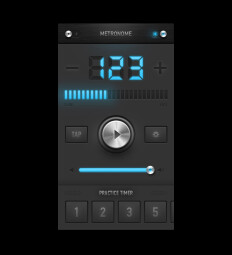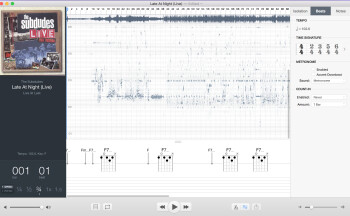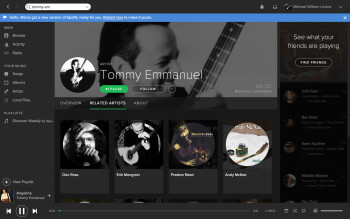Are you in a rut on your instrument? Do you feel like you’ve been playing the same old stuff forever without any significant improvement? If so, and if you’re willing to commit an hour or so a day to your craft, you can improve your abilities appreciably, and broaden your musical horizons with the multipart strategy outlined in this article.
Take lessons

Studying with a good teacher is the best and fastest way to kick start your playing. Your teacher can show you techniques, set you up with exercises, help you learn parts from recordings, keep track of your progress and offer moral support. What’s more, you’ll be more motivated to practice if you’re expected to come in and play stuff for your teacher that he or she assigned you to work on between lessons. It’s pretty embarrassing to show up at a lesson, and be unable to play the assignment.
Finding a good teacher is key. Ask your friends and your musician colleagues, and try to find someone who is attuned to your musical style, who you get along with, and who isn’t so expensive that you can only afford the occasional lesson. Once a week is best, once every two weeks is still pretty good.
If it’s not practical to have in-person lessons, consider online lessons. The best is with a live teacher via Skype, but there are also tons of tutorial videos available. The problem with the latter is that they can’t listen and critique your playing or suggest things to learn based on your abilities.
That said, companies are coming up with new and different ways to teach music online. For example, Artist Works is a website that uses a hybrid approach, offering prerecorded video lessons with top-flight (and in many cases very well known) musicians, and allowing students to video themselves playing and send it to the teachers for critique. If you do enough searching, asking around, and reading of online reviews, you should be able to find a decent site to use, in lieu of a real teacher.
Set up a regular practice schedule

A practice regimen that you follow regularly is a key element if you want to improve on your instrument. It’s true that scales and exercises (or rudiments if you’re a drummer) can be boring, but they’re useful in two important ways: They improve your chops, and they add to both your conscious and unconscious knowledge (muscle memory) of your instrument. Like with any physical exercise, if you do it regularly, you’ll progress.
If you’re going to work with a private teacher, he or she will set you up with a practice routine that fits your experience level. If you’re doing it on your own, do some research and get a couple of exercise books that are appropriate for your instrument, your musical style, and your playing level. Make sure the scales and exercises you do are not too easy, you want to challenge yourself. Method books for your instrument are a good place to look for exercises.
If you read music, you’ll have a lot more options available. Guitarists, bassists and players of many other stringed instruments who can’t read music can find exercises written out in tablature. If you’re a non reader, look around online and try to find video or audio files containing practice exercises. YouTube, especially, is full of videos of players on different instruments showing scales and exercises of all types.
Once you settle on an initial set of practice exercises, do each one for 10 or 15 minutes a day, and make sure to use a metronome. When you’re trying to build up your chops, a metronome is your best friend. Not only does it help you play the exercises in time, it also gives you a way to measure your progress. When you first start practicing, set the metronome to a slow enough speed that you can cleanly play the exercise, and write down the BPM setting. Once you feel comfortable with what you’re playing, try speeding it up a little. Never exceed the speed in which you can play the exercise cleanly. After a couple of weeks, compare the BPM setting you’re at with the original one — you should see a significant speed improvement.
Again, once you’re comfortable, a useful trick is to use the metronome to give you beats 2 and 4 of the measure only (for a 4/4 exercise, that is). You’ll have to set the speed slower, because everything will be doubled, but it is better for developing your sense of time and your feel.
Figure it out

Scales and exercises are good for building your chops, but you also need to expand your ideas. Part of your daily practice should be devoted to learning parts from other players. This is not to say that you should exclusively be a copy cat. You want to develop your own voice on your instrument. But seeing how other players approach various aspects (soloing, comping, etc.) will help you build vocabulary that you can use as a springboard for your own ideas.
There are plenty of software programs and mobile apps that facilitate learning from a recording by letting you play it back at a slower speed, without changing the pitch, making it easier to figure out and play along with. If you can’t figure out how to play something by listening to it — even slowed down — you can try to find the part written out in notation or tablature (depending on your instrument). The problem is that a lot of what you’ll find online is not accurate or it’s been simplified. Officially published music books will be a better source for accurate transcriptions. Of course, if you have a teacher, he or she can help you figure out parts.
Play with others
There’s nothing like playing in real situations with other musicians to help improve your playing. It forces you to get it right or look bad. Playing in a band is a good way to do this, or if not, you could at least jam regularly. The key here is to try to challenge yourself, and, if possible, play with musicians who are a little above your level. If you play all the time with musicians who are less experienced than you, you won’t be pushed — in fact, it can drag your playing down to their level. Conversely, if you play with musicians that are better, you have extra incentive to improve. Obviously, somebody who’s way more advanced probably won’t want to play with you, so we’re talking about slight rather than huge differences. The bottom line is if a playing situation isn’t challenging, it’s less likely to help you improve.
Expand your horizons

Another key activity that will help you improve on your instrument is to do a lot of listening to great players. Listen to players that you like, and discover others you hadn’t heard of through searching online. The more you listen, the more you’ll absorb of not only the actual playing of musicians you like, but also the zeitgeist of the particular musical style (or styles) you’re trying to improve your playing in.
Playing an instrument well requires more than just chops, it requires an understanding of the nuances of the genre and, of course, good taste. Both can be improved upon with a lot of listening.
Also make an effort to listen outside of your chosen genre(s). One common thread that most top musicians have is that they listen to lots of different styles and develop ideas that come from many musical directions.
Final word
If you had every day free with no responsibilities, you could spend it all practicing and learning. But in the real world, where free time is often a precious commodity, targeting a realistic chunk of time every day to practice and learn, taking lessons, and finding as many opportunities to play with other musicians as you can, is a good strategy to propel your growth as a player. If you’ve got the will, there is a way.
